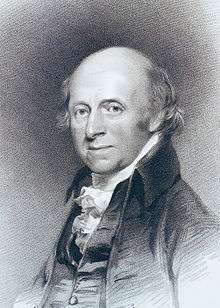William Coxe (historian)
William Coxe FRS (17 March [O.S. 6 March] 1748 – 8 June 1828) was an English historian and priest who served as a travelling companion and tutor to nobility from 1771 to 1786. He wrote numerous historical works and travel chronicles. Ordained a deacon in 1771, he served as a rector and then archdeacon of Bemerton near Salisbury from 1786 until his death.[1]
William Coxe | |
|---|---|
 William Coxe engraving by W. T. Fry, 1904 | |
| Born | 17 March 1748 London, England |
| Died | 8 June 1828 (aged 80) Bemerton, England |
| Resting place | Fugglestone St Peter, Wilton, England 51.081524°N 1.855444°W |
| Nationality | English |
| Education |
|
| Alma mater | King's College, Cambridge |
| Occupation | Historian, archdeacon |
| Years active | 1779–1828 |
| Spouse(s) | Eleanora (née Shairp) |
| Parent(s) |
|
Biography
William Coxe was born on 17 March [O.S. 6 March] 1748[2] in Dover Street, Piccadilly, London, the eldest son of William Coxe (c. 1710 – 1760), a physician to the king's household, and his wife, Martha, daughter of Paul D'Aranda.[1] He was the older brother of the writer and poet Peter Coxe (c. 1753–1844),[1] who wrote the poem "Social Day". Following his father's death in 1760, his mother married John Christopher Smith, who was Handel's amanuensis.
Educated at Marylebone Grammar School (1753–54) and then at Eton College (1754–64), Coxe matriculated to King's College, Cambridge at Easter 1765.[1] He received his BA in 1769, and his MA in 1772.[1] From 1768 to 1771, he was a fellow of King's College. Coxe was ordained a deacon in London on 21 December 1771 and a priest on 15 March 1772.[1]
Coxe travelled throughout Europe as a tutor and travelling companion to various noblemen and gentlemen,[3] including Lord Herbert, son of the Earl of Pembroke; and Samuel Whitbread of the brewing family. He wrote prodigious and detailed accounts of his travels with Lord Herbert around the Swiss and French Alps, which were subsequently published.[4]:640
In 1786 he was appointed vicar of Kingston upon Thames, and in 1788 rector of Fugglestone St Peter-with-Bemerton, Wiltshire. He also held the rectory of Stourton, Wiltshire from 1801 to 1811 and that of Fovant from 1811 until his death. In 1791 he was made prebendary of Salisbury, and in 1804 Archdeacon of Wilts until his death twenty-four years later at age 80.[3] He died on 8 June 1828 in Bemerton, and was buried in the chancel of St Peter's Church at Fugglestone St Peter.
In 1803, Coxe married Eleanora, daughter of William Shairp, consul-general for Russia, and widow of Thomas Yeldham of St Petersburg.[3]
Works
In addition to his travel writing, during his long residence at Bemerton Coxe was mainly occupied in literary work.[3] His publications included:
- Sketches of the Natural, Political and Civil State of Switzerland. London: J Dodsley. 1779.
- Account of Russian Discoveries Between Asia and America. London: Thomas Cadell. 1780.
- Account of Prisons and Hospitals in Russia, Sweden and Denmark. London. 1781.
- Travels into Poland, Russia, Sweden and Denmark. London: Thomas Cadell. 1784.
- Mont Blanc and the Adjacent Alps. London: Thomas Cadell. 1789.
- Travels in Switzerland. London: Printed for T. Cadell, In The Strand. 1789.
- Letter on Secret Tribunals of Westphalia. Salisbury: J Easton. 1796.
- The Life of John Gay. London: Salisbury J Easton. 1797.
- Memoirs of the Life and Administration of Sir Robert Walpole, volumes 1-3. London: Cadell & Davies. 1798.
- William Coxe, ed. (1798). Gay's Fables. London: J. Easton.
- Anecdotes of George Frederick Handel and John Christopher Smith. London: W. Bulmer and Co. 1799.
- An Historical Tour in Monmouthshire. London: Thomas Cadell, Jun., and W. Davies. 1801.
- Memoirs of Horatio, Lord Walpole. London: Longman, Hurst, Rees and Orme. 1802.
- History of the House of Austria. London: Cadell & Davies. 1807.
- Memoirs of the kings of Spain of the House of Bourbon. London: Longman, Hurst, Rees, Orme and Brown. 1813.
- Memoirs of John, Duke of Marlborough. London: Longman, Hurst, Rees, Orme, and Brown. 1818–19.
- Private and Original Correspondence of Charles Talbot, Duke of Shrewsbury. London: Longman, Hurst, Rees, Orme, and Brown. 1821.
- Memoirs of the Administrations of Henry Pelham. London: Longman, Rees, Orme, Brown and Green. 1829.
References
Citations
- Knight, Jeremy (2004). "William Coxe (1748–1828)". Oxford Dictionary of National Biography. New York: Oxford University Press. ISBN 978-0-19861-351-0.
- "William Coxe (CKS765W)". A Cambridge Alumni Database. University of Cambridge.
-

- Coxe, William (1777). Pinkerton, John (ed.). Travels in Switzerland and in the Country of the Grisons 1777. A General Collection of the Best and Most Interesting Voyages, Vol. 5 1809. London: Longman, Hurst, Rees, and Orme. Retrieved 14 February 2016.
External links
- "Archival material relating to William Coxe". UK National Archives.

- William Coxe at the Open Library
- Travels in Switzerland by William Coxe at Viatimages